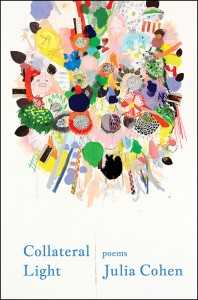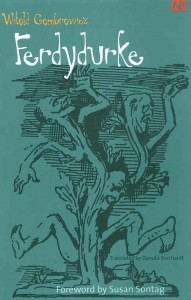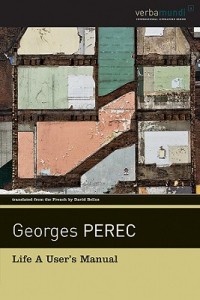Collateral Light by Julia Cohen
 Collateral Light
Collateral Light
by Julia Cohen
Brooklyn Arts Press, Oct 2013
94 pages / $15.95 Buy from BAP or SPD
On the first page of “No One Told Me I Was the Arrow”, Julia Cohen writes:
a life
of sea-
sickness
dreaming of ships
An insect
on snow
At the limit
of our
body
a brief spasm
of laurels
Caught, sickness, limit, spasm. No one told her. In this, the first poem in Collateral Light‘s first section, Cohen seems to be setting forth an aesthetic program both in her subject matter and in the laconic precision of her style: To move over the frozen terrain of an aestheticized life, practicing an insect-like lightness and thereby avoiding falling into the ‘snow’. This is not, in itself, an unadmirable pursuit. It is also one to which poetry is particularly well-adapted–is there any medium more capable of lambently exploring ‘the limit/of our/body’ without becoming mired? And yet perhaps I can be forgiven that my heart dipped in my chest at the prospect of another book devoted to elegies on the subject of inability and asymptotes. It therefore came as both a surprise and a relief when Cohen discards her regretful tone at the poem’s conclusion:
my point
plunge
into a glass
of soil
“An insect/on snow” nothing, O me of little faith. Cohen is ready and able to dive within. In Collateral Light, we have the pleasure of going with her.
Over course of the poems following this introduction, Cohen delivers on the promise vested in the conclusion of “No One Told Me I Was The Arrow”. Her writing revolves around shifts, mutations, permanence, lability. Certain terms recur with such regularity that they become fraught, even overloaded, with meaning. Arrows (those symbols of both indication and entry) appear again and again, both negatively (“My pixels/deflect arrows”) and positively (“I’m filled/with invisible arrows”). Coats, husks and shells are shedded or pierced, disrupting the boundaries between the within and without of a given person (as when she writes, “Kiss my puppy lips my deer lips/the animal inside that animal/alive & yelping through the skin”). The introduction or relaxation of this confusion is at the center of many of Cohen’s more arresting passages, such as in the eponymous poem’s opening lines:
inside your face
& look down
at the sunken garden
My toes are cute
My packet of
bees comes in
Spreading whiteness, imperfect memory, gardens (be they sunken, frozen, night-, or made up of “Fake flowers burst forth from fake seeds”), ice, frost, veins, circulation and filtration. The throughlines multiply without compromising the slow, considered style. Cohen knows how to play to the strengths of that style; this is perhaps best-displayed by the particularly wonderful “The Decoy Museum Is Still”, in which sparse lines such as, “You walk into a stranger’s dirty pocket of air,” seize attention through their quiet profundity.
Cohen deserves to be lauded for what she is doing, but it’s nonetheless worth noting what she avoids doing. Her poems are both active and interactive, and yet possess none of the common signifiers that contemporary readers might associate with such terms. The rhythm is not argot-conversational or rat-a-tat percussive; the verses are not fit to bursting with pop-culture bricolage; there is no compulsive disgorging of confessional factoids. Cohen engages the reader through the steady application of precise language, carefully maintained across the length of each individual work. She never abandons her mode in favor of spasmodically gesturing beyond the limits of comprehensibility. If it seems like I’m belaboring the point, here, it’s because it’s a point that could stand a little belaboring: In a time when contemporary poetry is frequently (and unfairly) pigeonholed as belonging to either a hermetically classicistic tradition or a hypermodern, glossolalic movement, Cohen does not allow herself to be lumped in with either.
December 2nd, 2013 / 12:00 pm
An Unconstrained Review of Gombrowicz’s Ferdydurke
 Ferdydurke
Ferdydurke
by Witold Gombrowicz
Yale University Press; First Edition edition, August 2000
(First published 1937)
320 pages / $8 – 25 Buy from Amazon
Talking past us, talking at us, at the open, the grand begin, from the onset another one of those sharp-edged misanthropic types, ever painful, absurd, so put-upon, the youthful thumb-bite, Lucky Jim, careening off the edge of thought, Under the Volcano, failing to recognize the genius before them, as though that “one-by-one box of bone” were such a shame for strangers, never to really know us, “ordinary fucking people”, sez our protagonist, Joey. From that position of unsteadiness, the feared impossible: not only the absence of reward, its perfect vacuum, sez our Joey, reversed through time to grade school again so that he might try a little better, having done something bad, having made a mistake. Luckily, it can be reversed.
How can we reconcile this, this poetic sensibility, with such devastating crudeness? Where is the perfect delicacy we’d been taught to cherish, the winking allusion, where do we find the much-needed descriptions of flowers, fields, a fencepost outside Dublin, waves, the blooming of the sakura blossoms, the vividity of maggots teeming in some peasant’s loaf of bread? How will we know how to think of trees if our books don’t tell us? There isn’t even bread here, all the crying children are assholes, the adults hem and haw and reinforce the base. Desire is the catalyst to every reaction, desire, especially those forms which fraternize with grasping, pinching, plumping. He reaches out and takes, he hides, all parties are whisked around like the Country Doctor, excepting those strangers who don’t seem in on the joke . . . but that would mean that we were in on the joke. Were we in on the joke? Where one of our sallow-cheeked Anglophile businessmen might pretend not to be in the apartment while some financial superior is banging down the door for up to five pages at a time, our rollicking little twit plays a long con through the door for . . . well, time kaleidoscopes, but he knows that she knows, she know or does not know, she would never let on, he would never let on. You thought of sex, then? How pathetic. A flower in a shoe provokes a scent-conspiracy enacted by a schoolgirl, but class warfare becomes a bonk on the nose. Anyway, back to sex. I’m not being coy, it’s just that the hierarchy of things is all messed up by Witty, and in the process he’s somehow managed to sneak a guffaw through the keyhole of a sneer. What is any one thing worth to another? I suppose it is true that I don’t know. The only difference between our world and his is that ours is occasionally illogical.
There is some other world out there where certain figures didn’t suffer the storm: Gombrowicz, Babel, Schulz, Brod. Kafka does too, the lucky devil. A whole separate slew of old white men, if a little more sickly than those we wound up choosing for the canon. Perhaps, in this other world, their full lives came at the expense of the popularity of a few of our dour old lepidopterists, those white-haired academicians who made ‘thrilling sentences’ and taught generations of young creative writing students the value of having that same sallow-cheeked businessman’s hands shake while he’s doing the dishes, just a few sentences before the end of the story. Couldn’t we afford to lose some of those endlessly relatable repressed suburbanites? Is it very hard to imagine a world where our writers reminded us, a little more angrily and a little more often, how near we are to nonsense? How funny that is, how sad it is? How horrifying the vacuum, how easy to gibber into it until it at least looks full? Wherefore the men for whom we golf-clapped, endlessly pleasing one another beneath the table?
It is very considerate of us to have excused ourselves for the inconvenience we posed, which did, after all, allow us plenty of time to swap spit-bubbles from Eliot, Pliny, Byron, Mistah Kurtz, to forget about Odessa in favor of some finely hyphenated adjective from the Odyssey, appended like a broach to the neck of a sentence. Still, what is it that drove Gombrowicz to stay in Argentina, what is it that drove an Argentine at the ‘opposite pole’ from the Pole to ask, “Who shall tell me, Israel, if you are found in the lost labyrinth of my blood?” Are we assuming that a people’s ability to save their own work from the fire exonerates us from the time we spent watching from across the street, if not working the bellows, if not ourselves the fire?
October 4th, 2013 / 11:00 am
Unconstrained Review of Perec’s LIFE A USER’S MANUAL
 Life: A User’s Manual
Life: A User’s Manual
by Georges Perec
Translated by David Bellos
David R Godine, 2008
685 pages / $22.95 Buy from Amazon
We were briefly offered one possible way out of the overwhelming Order that was being brandished against us: Writing, they said, could become like a kind of a game, in which the rules are made transparent, the walls clearly delineated, all objects in their proper places, the experience of reading itself an observation of the established rules left to frustrate all possible variables against themselves for the length of a poem, a story, a book. She bemoaned her loneliness, felt estranged by her intelligence, but would also brag, gripe, brag, about the capacities given unto her by her remarkable talent for finding her way around a party, the geometry of pleasing arraignment, a kid genius of the light touch, claiming she knew what to give people to make them happy, to make them like her, cried, felt lonely, spent time in and out of centers for people like her, realized that she was already older than she had thought she would be while all this was still going on for her. None of that without some grounding in truth. A little like following thirty steps of penned directions, winding up in the wrong place, and only looking toward the last step as the source of any possible error. ‘Move like a knight does.’ Couldn’t bear to be around people as bright as her, unless it was one other man. A very slow, considered move across the exposed side of a Parisian flat, moving like a knight does, in a moment that we have to assume is the only possible moment it could be written, no abutting moment qualifies, the fullest instance of a tableau, thereby, for the time being, abstracting death, in that it has ceased to approach. The quiddity of death is in its unceasing approach. Already, we are fighting an uphill battle.
Perec, Calvino, Queneau, others: Oulipians. Calvino’s Invisible Cities: One of those few books that ‘everyone loves’. Calvino: Also well-known for Cosmicomics, similarly well-loved. Those two books comprise the lasting popular of Oulipo. Queneau: Exercises in Style, a book, which, ‘it is good that they exist’, but God forbid anyone ever actually have to read it. He is cellmates with Sol LeWitt. Calvino: Whimsical (Márquez), sexually precious (Pasolini), transparently formal (Coover), with privileged access to some elemental quality of ‘the story’ (Borges). Similarly unconcerned with death—or, at least, a death that whatsoever resembles the death that awaits us poor, existent informalities. Leery of, but on the whole grateful for, him and his place in every bookshelf. Occasional shrugging permitted. People whom we had thought were our friends accused us of creating materials that the bored leisure class could use to occupy the time between now & the timelessness. Some of us responded by creating very detailed wallpaper, apparently.
Out of this, Life A User’s Manual. The most possible observation of the materials that are drawn into the orbit of a life lived, as little possible observation of what it is all these things are to act as a totem against for the persons that acted as gravity wells. For us, the limited but monstrous expansion of the gap between two instants. The first few belayed momentums, in which Perec begins to draw a line and then ceases to draw a line, produce what is best described as the literary equivalent of the phenomenon of ‘learned helplessness’, viz. if one tries something enough times, only to be rebuffed every single time, they will cease trying, will lie down, will lie there. We begin to follow a story’s arc, it is interrupted, perhaps it will be resolved in 600 pages. If it is not, I will certainly not remember which stories were not led nowhere no one saying nohow on, though I take diligent notes, though how on is never complicated. I slip into a pleasant coma. I read more quickly than usual. The music box, yes. The dusty globe, yes. What does death matter? Someone’s uncle had an adventure, once. I am being lied to, I am not being lied to, I cease desiring to rise to the occasion of questioning. Periodic conceptual synchronicities between seemingly disparate entities, as well as immediately attractive prospects (the blanking of a puzzle piece, the forged document, a mistaken identity, a murder mystery concerning a telephone), turn my anesthetized stupor into a mildly giddy audienceship. When someone is ‘poor’, it means that their clothes are rakish or their history a little more multifarious. When someone is a ‘servant’, it means that they are in a different room, or are in a different position in the same room. The thought of the form occasionally recurs, discourages active imagination. The thought of attempting to work out ‘where one is’ or ‘how far is left to go’ is indescribably unattractive.
September 23rd, 2013 / 11:00 am
